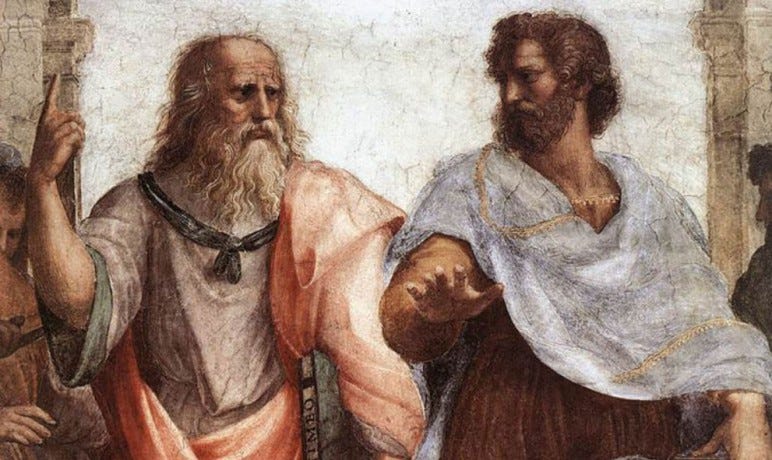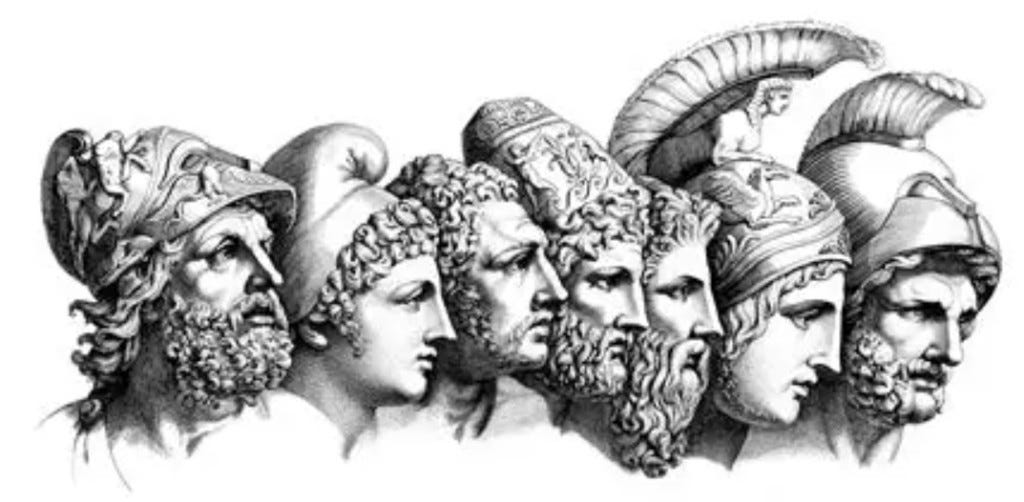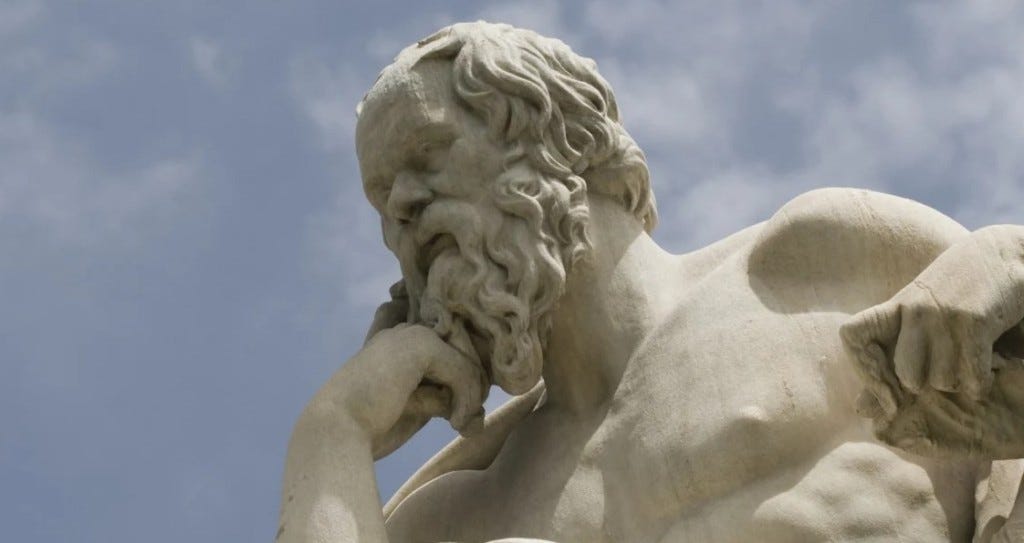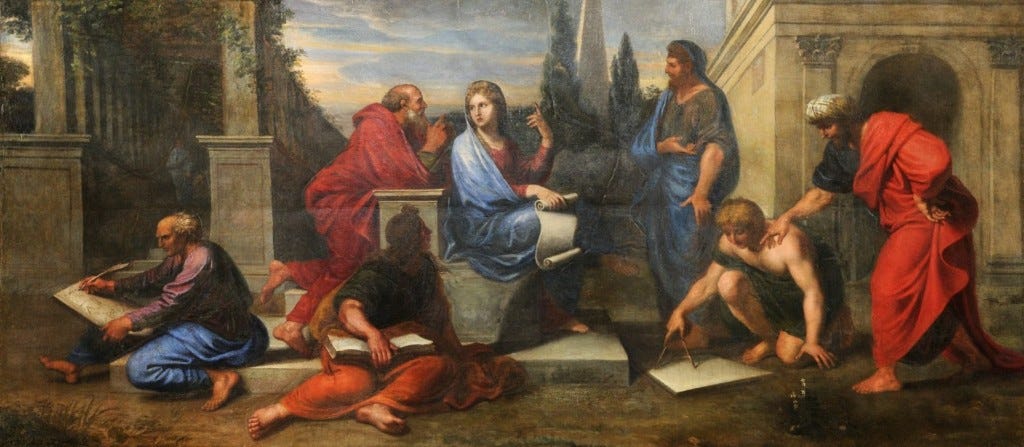A guest post from WD James of Philosopher's Holler.
In 399 BC, an Athenian court condemned and then executed a stonemason who had served honorably in several of her wars. The man, like most condemned criminals throughout history, left no written record of his life and doings. His father had likewise been a stonemason and his mother a midwife. Though 70 years of age, the man left behind three sons, one a babe in arms, and a wife.
Such are the ways of many ordinary people, the vast majority of whom are condemned by history to obscurity. This man, in this as in much else, was different. Though we have no account of the man’s life written by his own hand, we do have an account of his trial recorded by a young Athenian aristocrat.
The young aristocrat was named Plato and his beloved mentor was Socrates.
The details of the trial were recorded in a dialogue known as the Apology (so named not in the sense of ‘I’m sorry,’ but in the sense of ‘this is why I have acted as I have’).
A trial, in the legal sense, means an examination. More broadly it refers to any testing of quality or fitness. Most broadly it entails a revealing: what was hidden is exposed, truth that was obscured is made manifest.
We can read Plato’s account of Socrates’ trial as all of these. Socrates’ actions are investigated and examined. As he offers his defense his whole mode of life comes into play and we learn how well he carried out his self-appointed task as a truth seeker (his real vocation). What is revealed is the way of life and activity of truth seeking: of philosophy. For Plato, and many ever after, Socrates served as the model or archetypal philosopher.
So, in Socrates’ trial, truth itself and the life devoted to it are in the dock. It is worth noting that in some ways it is remarkably similar to another trial of another skilled craftsman in the ancient world who likewise left no written record of his deeds or thoughts but who influenced history through the accounts of his devoted followers. There a Roman governor had bluntly asked the accused Galilean dissident ‘What is truth?’
In this series of essays, we will make a detailed study of the Apology. Unlike most of Plato’s dialogues, this one contains very few arguments. Here Socrates is illustrating aspects of the philosophical life which undergird the doing of philosophy.
Socrates is a truth-seeker. This is presented along the lines of a fundamental existential orientation. It’s not something he argued himself into – it’s more basic than that. Socrates has opted for the truth. What we get in his account and defense of his way of living is a picture of what a life lived in devotion to truth looks like and what character traits (virtues) are essential to sustain it.
In his lively and very readable biography, Socrates: A Man For Our Times, Paul Johnson links Socrates with two other thinkers of that time: Confucius and the prophet Ezekiel (who took the newly edited Torah from Babylon, where the Jews had been captive, to Jerusalem). As Johnson sees it, all three lived in civilizations that were under duress and threat, much as ours is now. All three pointed to the centrality of the need for moral education and character formation for the sake of both individual happiness and cultural rebirth.
Finally, we will see how Socrates flips the script on his accusers. And not only on his accusers but on his judges, the jurors. The example of his life tries the lives of these others and they are shown to be wanting. This is another similarity with the example of Jesus. As in that case, the judicial drama also challenges us to reflect on where we stand and how our lives measure up.
The hero archetype
Further, in his dialogue, Plato gives us an account of Socrates’ defense speech at his trial. Plato was present at the trial (as attested in the Apology itself, 38b) so his account is a first-person one. We have one other first-person account by another student of Socrates, Xenophon. There is a contemporaneous account of the prosecution’s case written by Polycrates the sophist. While Plato’s account should not be seen as a modern journalistic account, let alone a transcript, it is held to be an accurate presentation of Socrates’ basic speech.
However, it is not just that. Plato is a literary master and there is always more going on than is immediately present on the surface. In the way Socrates’ speech is constructed, in the dramatic setting of the trial itself, and in how he frames it and the references he makes, Plato is doing nothing less than recasting the classical Greek conception of heroism. Socrates was clearly his personal hero. He also thought that the philosophic activity itself, as exemplified by Socrates, was a form of heroic quest.
Joseph Campbell’s The Hero With A Thousand Faces is a standard touchpoint for understanding the hero archetype. Campbell situates the context which calls forth the hero as society in a state of breakdown, as all societies always are after their initial founding.
As societies break down, on his telling, the “figure of the tyrant-monster” emerges. After an initial period of genuine community, the society falls into factional and individual striving and the tyrant-monster is the “hoarder of the general benefit” (Campbell 2008, 11). This condition calls forth a redeemer, the hero. Once societal divisions have reached a certain point, the society lacks the internal resources to renew genuine order: it must be “dismembered totally, and then reborn” (Campbell, 2008, 12).
“The hero, therefore,” he goes on, “is the man or woman who has been able to battle past his personal and local historical limitations to the generally valid, normally human forms” (Campbell 2008, 14). The hero is the one who gains the sort of enlightenment, typically through a series of struggles, which will provide the needed resources for his or her society to reconstitute itself beyond selfish divisions. Promethius, Odysseus, the Buddha, Jesus, and Beowulf all respond to this mission, as do all other heroes.
The narrative of the heroic struggle follows an archetypal patten as well. “The standard path of the mythological adventure of the hero is a magnification of the formula represented in the rites of passage: separation [the hero must journey forth from ‘home’] – initiation [the hero must go through various ordeals to achieve enlightenment] – return [the hero comes back home to redeem or save it]” (Campbell 2008, 23).
Further, it is essential that the hero return home and be reintegrated into their community to allow for “the continuous circulation of spiritual energy into the world” (Campbell 2008, 29). Campbell holds that the myths and fairytales of redemption were traditionally regarded as the highest rank of tale in the ancient world, higher even than tragedy, as they convey a “revelation more complete” (Campbell 2008, 21).
So, the basic pattern and structure of hero myths then is: there is disorder at home, the hero goes forth on a journey, through trial and testing they gain enlightenment into deeper truths, then return home to bring this knowledge to their kith and kin to allow for the spiritual renewal of their family or society.
Socrates as hero
Early in the dialogue, Socrates addresses the jurors with these words: “I want you to think of my adventures [ie, his living of a philosophic life] as a cycle of labours…” (22a), clearly comparing himself to Hercules who was reputed to have performed twelve heroic labours. A few things are going on here. In the context of Socrates’ speech, he is recounting his encounter with the Oracle of Delphi – Hercules had, according to legend, also visited Delphi to receive his tasks. Further, on the Greek model of mythic heroism, Hercules is no mere mortal: heroes most literally were understood to be the offspring of a mating between a god and a human, so they were metaphysically superior to regular run of the mill human beings, though they could still serve as role models. In a later essay we will delve more deeply into exactly how Plato might have held Socrates to be associated with divinity.
Socrates also likens himself to the “heroes who died at Troy” (28b) and avers his steadfast commitment to the philosophic life: “Where a man has once taken up his stand, either because it seems best to him or in obedience to orders, there I believe he is bound to remain and face the danger, taking no account of death or anything else before dishonour” (28d). Socrates had adopted the philosophic life both because it seemed best to his own judgment and also because he believed he lived under a divine command to do so.
But lest we think Socrates is suffering delusions of grandeur or is too full of himself, his famous irony is never far away. He explains to his jurors: “To put it bluntly (even if it sounds rather comical) God has attached me to this city, as if to a large thoroughbred horse which because of its great size is inclined to be lazy and needs the stimulation of some stinging fly. It seems to me that God has attached me to this city to perform the office of such a fly; and all day long I never cease to settle here, there, and everywhere, rousing, persuading, reproving every one of you” (30e). The new hero is like a stinging insect, a gadfly, an annoyance.
Who is a philosopher?
We might be thinking that even with this last note of self-deprecation, if all philosophers think of themselves as on a heroic mission from God, that is some pompous group of people. If we take ‘philosopher’ to refer solely, or even mainly, to the inhabitants of academic departments of Philosophy, the issue is even more preposterous.
To correct this, we need to keep in mind that while certain people were marked out more than others in the ancient world as ‘philosophers’ (usually because departing from Socrates’ example they set themselves up as teachers, sometimes accepting money in return for their services, and many times adopting a particular fashion in dress to denote the specific school of philosophy they belonged to) Socrates’ practice mitigates against this.
For Socrates, ‘philosopher’ always primarily meant literally ‘lover of wisdom’ or ‘lover of truth.’ He did not shy away from engaging in philosophical discussion with anyone, rich or poor, esteemed or obscure, man or woman, slave or free. In the ancient world to adopt philosophy, or a philosophy, was to choose a way of life not a job; you might be doing any job, but you could do it philosophically or not philosophically.
The aim of adopting philosophy was to learn to live well whatever vocation one pursued. This is not a task intended for just a select few – it is the universal human vocation in accordance with our human nature. Hence, Socrates thought that everyone could benefit from approaching life philosophically.
So, when Plato sets Socrates up as a new kind of hero and role model it is not along the lines of a patron-saint who is tied to a particular trade, place, or circumstance. He is meant to be something more than and above this: a universal model for all who are willing to accept the self-discipline of living well which ideally is everyone. This also entails an egalitarian element. No longer is the hero only the person of noble birth or the person who carries out amazing martial tasks; it is potentially anyone.
On the flip side, since Socrates is meant to represent the embodiment of philosophy, Plato is also saying something about it as a practice. It should not be understood primarily as a technical science or craft (as it almost exclusively came to be understood in the modern university, and to a considerable extent even in the medieval university), but as a heroic quest. In that case, those who seek to introduce others to its practice should be seen less as teachers than as initiators into the adventure.
Campbell, Joseph. The Hero With A Thousand Faces (Third Edition), New World Library, 2008 (original edition 1949).
Johnson, Paul. Socrates: A Man for Our Times, Viking, 2011.
Plato, The Last Days of Socrates: Euthyphro, Apology, Crito, Phaedo, translated by Hugh Tredennick and Harold Tarrant, Penguin, 2003.










I read so much on sub stack . Glad I didn’t miss this one . I too am a truth seeker . So now knowing he led a simple life and questioned what came into his field of vision . I can relate to the man . I make a new friend every day now. Exploring another persons life story and opinions is a great life.
Great exploration of Socrates . New insight of the tale